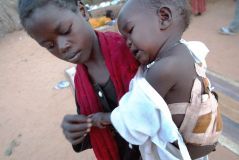US mulls resolution on ICC trials for Sudan suspects
By Evelyn Leopold
UNITED NATIONS, March 30 (Reuters) – The United States sought amendments on Wednesday to a French-drafted resolution that would allow the International Criminal Court to try perpetrators of pillage, slaughter and rape in Sudan’s Darfur region, diplomats said.

|
|
A 14- year-old Sudanese girl holds her wounded baby brother, hit by shrapnel from an aerial attack in North Darfur, October 2004. Their mother was killed in the bombing attack. (HRW). |
Although opposed to the court in principle, the envoys said the Bush administration was considering language that would exempt U.S. citizens in Sudan from the court’s jurisdiction.
As a result, a vote on a resolution about where to refer war crimes suspects has been postponed until at least Thursday while U.S. officials confer with council members who have ratified the treaty establishing the ICC.
No one expects the United States to vote in favor but European envoys, strong supporters of the court, hope Washington will abstain in exchange for some changes in the text.
Over the last two years, at least 180,000 people have died each month from fighting, hunger and disease in Darfur, and more than 2 million have been forced out of their homes.
The resolution would be the third in a week after seven weeks of negotiations that have frustrated council members.
The first, drafted by the United States, was adopted last Thursday and authorized a 10,715-member peacekeeping force to monitor an accord in southern Sudan that ended a 21-year old civil war.
And on Tuesday, the Security Council, in another U.S.-initiated resolution, voted to impose a travel ban and an asset freeze on individuals in the Darfur region of Sudan who commit atrocities or break cease-fire agreements.
In January, a panel of U.N.-appointed investigators, requested by the Security Council, concluded that the ICC was the best place for trials since Sudan had shown little willingness to prosecute suspects.
“CLEAR MESSAGE”
The United States has offered to pay for a U.N.-African Union court in Arusha, Tanzania, but the proposal has received scant support because of the time it would take to find judges, prosecutors and investigators.
The Security Council can refer a case to the ICC, based in The Hague, if the country where the crimes took place is unwilling or unable to bring perpetrators to justice. The Bush administration opposes the ICC, fearing its citizens would be targets of politically-motivated prosecutions.
But Richard Dicker, counsel for Human Rights Watch and an expert on the ICC, cautioned that this court could not be the only answer to accountability for war crimes because it would probably only try some 15 top people.
For the other suspects, he said Sudan should conduct trials with international assistance. He said leaders in the Khartoum government were “very sensitive to the threat of prosecution by the ICC and that is something they take seriously.”
Dicker said there were no guarantees the ICC would serve as a deterrent for future crimes but “I think it sends a real clear message that those most responsible will be held to account.”
Nine of the 15 Security Council members have ratified the treaty establishing the ICC and three others have signed it.
